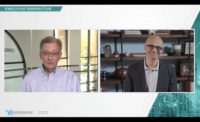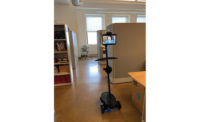
As chief information officer and senior vice president at software vendor Bentley Systems, Claire Rutkowski spends a great deal of time talking to Chief Technology Officers and other tech-minded people in AEC firms. Earlier this summer she hosted a panel at the Environmental Financial Consulting Group's Technology Leadership conference on what technology for remote work means in the future, as some firms transition to bring some workers back to the office. Rutkowski took the time to chat with ENR Senior Technology Editor Jeff Rubenstone about how technology is enabling long-term remote working, and what managers must learn to run a hybrid office. The transcript has been lightly edited for clarity.
ENR: Here we are, more than a year into the disruption from COVID-19, and many companies still have employees working from home or are beginning to bring them back to the office. What has been your experience with this, both at Bentley Systems and among the industry firms you’re talking to regularly?
Rutkowski: This is a different world now. We're coming out of the pandemic into a world where employees have very high expectations and are being very clear about the fact that they don't want to go into the office every day. They want to have a hybrid model.
A lot of people are coming out of this [phase of] the pandemic and reassessing their life priorities and what they're doing. There's a lot of competition for qualified talent and a lot of that qualified talent is asking, do you have remote or hybrid options?
I think that the majority of companies are thinking they're going to have to go hybrid in order to attract the right talent, but the other thing important to note is that—while we don't know what's going to happen with the Delta variant—in the meantime life has continued. Businesses have continued, deliverables have been met, and despite the kind of old school thinking of “I have to see you to know you're working,” I think people have realized throughout the pandemic that, in many cases, productivity has gone up, not down.
ENR: Being present in the office was a key part of many office cultures before the pandemic, with managers walking cubicle rows to confirm everyone is getting work done.
Pre-pandemic, most people were in the office. The managers did go up and down the rows, looking over people's shoulders, sitting in on design reviews and seeing literally see how things were going. During the pandemic everybody was remote, so managers have pretty much I think figured out the skill of managing remote colleagues. Or, if they haven't figured it out, the evidence of that is now becoming very visible.
But I think they're actually in for a harder time than that, because pre-pandemic was a level playing field, with most people in the office. Most people out of the office, working from home, is also [a level playing field]. Now we're going to get into a time where 70% of people want to be in or out, a hybrid [arrangement]. And some are going to be all the way at home and some are going to be all the way in the office for most companies. And it's not a level playing field anymore.
So the manager is going to have to learn those skills. “So now I have to manage remote? I have to manage in person and I have to make it feel fair and the same for everyone.” That's a whole different set of challenges. That's a whole new ball game that I think is going to require training. It's going to require a real concentration on different things that people haven't had to deal with.
They're going to have to be the ones that make sure that there isn't an A Team in the office and the B Team that is remote. They're going to have to make sure that when they have meetings, they don't just have all the “in the office” people that day—they're going to have to be careful how they keep the team together because it won't be together, but it won't be everyone apart and [working] remotely either. It will be in between.
ENR: Do you think there’s some anxiety among remote workers about not responding fast enough to requests, that persistent suspicion that managers think everyone who comes into the office is by default more on the ball?
Exactly, and I think that's something that managers are really going to have to watch for. They're going to have to mediate relationships between the people on their teams to make sure they are alert for resentment or jealousy, or that somebody who has chosen to be remote is kind of gradually shutting down, feeling less included and becoming disengaged. Because if the people who do not come in the office start feeling disengaged from the people who do then then you're going to see a loss of productivity and you don't want that right? I mean, purely from a work perspective. Lack of engagement is a lack of productivity is a loss of profit margin and revenue.
So I think managers are going to have to continue that understanding and empathy, and so are the leaders of the companies that used to have everyone in the office and decided to go hybrid. They can't choose to go hybrid to attract talent but then resent it everyday. Because that's not really fair either.
ENR: There’s also the issue of overworking and the reluctance to take time off that was already there before the pandemic in this industry. You have some work cultures where no one wants to be seen as absent or not totally engaged at all times, which gets extra stressful in extended work-from-home scenarios.
Last year and this year, I have talked about and emailed and written about mental health to the people on my team more than I ever have before. Whether it was at the beginning of the pandemic or later on, I could tell that people were online at like crazy hours and they sounded kind of tired. And I know there's the stress of the pandemic and everything around it to take into account as well.
And that may have been some of it, but I think it was also was they were really afraid that they were going to be let go. And so I found myself in the kind of unusual position of having a mandatory "all hands" in which I told everybody to stop working so hard.
I've never done that before, but I knew they were working unhealthy hours and I had to explicitly say “look, no one is looking over your virtual shoulder.” I get it, there's stuff happening, so let’s find a way to buffer between work and home, and I gave them some suggestions and then it was an email all about self care. It's OK to not be OK. It's OK to cancel your meetings for the day. if you're just feeling anxious and stressed, you don't have to turn on the dang camera, you know? Because I know some people find that mentally exhausting.
ENR: Do you see similar signs of anxiety across the broader industry in your conversations with CTOs and others at firms?
I think people in general are getting burned out. Not only do they have the pressure of trying to keep up the momentum and keep up with deadlines, but they’re doing it remotely and having to do virtual design reviews. Maybe they’re using virtual reality if they're lucky enough, but otherwise everything is just a little bit harder to do. It's that overall uncertainty of just not knowing what's going to happen next [with COVID-19]. It's exhausting.
ENR: Do you get the sense that, over a year into this, companies and management are beginning to adapt to the new state of affairs?
On the bright side, I do think companies have realized through the pandemic that their colleagues can be trusted to be productive remotely, so they're more open to that now. They've had to leverage a lot of digital collaboration tools and get used to asynchronous communication.
I think companies are much better equipped to handle it and have the right tools at least to handle it. And so the emphasis, as it did for me, moves from tools and skills and equipping people to care about and support people, mental health, engagement, and inclusivity, particularly from middle managers, to level that playing field. I would like to think that makes the AEC industry a more inclusive and better place to work overall.
ENR: Construction is often seen as being behind the curve on new technology and management styles. Do you think the industry is going to adapt to these new ways of working?
For the most part people are going to embrace the opportunity here. I don't think of this as just a choice between mandating return to the office or enabling a hybrid working model or allowing people to work fully remote. It's a leadership challenge. But it's also a leadership opportunity, an opportunity for the chief executive
CEOs will say “I’ve seen you all work productively for the last year and a half. I trust you to make the right choices for you and for your families about where you want to spend your time and how you want to work. But I also trust that you'll focus and work productively at work—whether you're at work at your desk, or whether you're at work at home.”
I think that CEOs who do this will find attracting and retaining talent easier, that the engagement and morale of their employees will improve and they will provide a much more inclusive workplace. I think they'll feel much more supported and welcomed to stay as long as they can work out the right kind of schedule with their manager.
For me it's a “lean in” moment. Are you going to do it or are you going to slip backwards?
Claire Rutkowski joined Bentley in 2016 from MWH Global where she served as chief information officer, responsible for delivering IT strategy, services, and support to 7,000 engineering professionals around the world. She now heads Bentley’s global IT organization, shaping and delivering a technology agenda across its global business.






Post a comment to this article
Report Abusive Comment